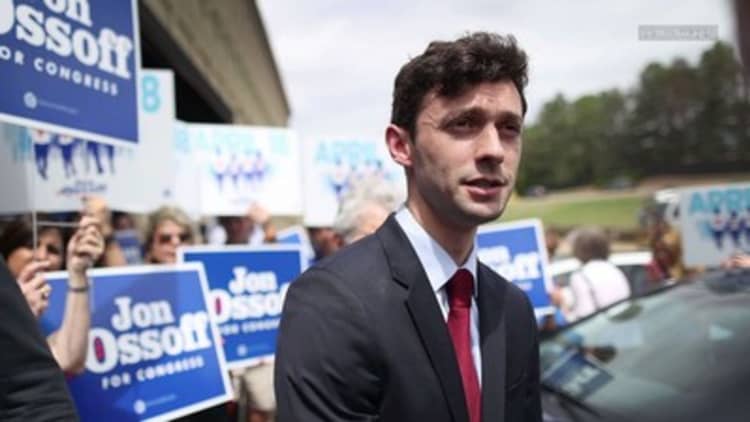
This race is like a presidential election in miniature.
Tuesday's special election in Georgia's 6th Congressional District is drawing national media attention, fundraising donations from the left and right from across the country, along with the involvement major special interest groups, and increasing attention from the White House.
The major players in politics are going all out to influence the vote that will be seen as an early indicator of more consequential elections to come, especially next year's midterms.
More from NBC News:
The Dems vs. Trump: Everything you need to know
Trump blasts Ossoff as the president jumps into the special election
Tom Cotton Faces Voter Backlash at Arkansas Town Hall
While candidates have tried to turn back to local issues, that hasn't been easy in the face of an astounding $14 million spent on advertising, countless magazine profiles and other major coverage, and the intervention of everyone from Samuel L. Jackson to President Donald Trump.
Signaling the significance of the contest, Trump attacked the leading Democratic candidate, Jon Ossoff, on Twitter Monday morning and robocalls featuring the president were launched as well.
"Liberal Democrats from outside of Georgia are spending millions of dollars trying to take your Republican Congressional seat away from you. Don't let them do it," Trump said in the recorded message. "Tomorrow there is a special election for Congress in Georgia. Only you can stop the super liberal Democrats and Nancy Pelosi's group, and in particular, Jon Ossoff. If you don't vote tomorrow, Ossoff will raise your taxes, destroy your healthcare, and flood our country with illegal immigrants."
Eighteen candidates — 11 Republicans, 5 Democrats, and 2 independents — will appear on the ballot Tuesday to compete for two slots in a June runoff election. That's unless one of the hopefuls can break 50%, in which case they win outright and will be heading to D.C.
Polls show Ossoff, who has shattered fundraising records and largely consolidated support on his side of the aisle, is almost certain to crush the rest of the field. It's remarkable position for a 30-year-old first-time candidate who can't even vote for himself because he lives outside the district (he has promised to move). There's no legal requirement that congressional candidates reside in the districts in which they are running.
But it may be a Pyrrhic victory if Ossoff doesn't cross the 50% threshold — and the latest polls show he is unlikely to reach that level of support — since a one-on-one runoff would be harder than the divide-and-conquer approach he's using now. In that case, Ossoff would likely be facing a Republican with the GOP united behind its candidate, not fractured as the party is now.
Former Rep. Tom Price, who vacated the seat to join Trump's Cabinet as Secretary of Health and Human Services, was the latest GOP occupant of a seat his party has held for nearly 40 years. Former Speaker Newt Gingrich once represented the district, as did Johnny Isakson, who went on to earn a promotion to the Senate.
But Trump, as both critics and fans will agree, has changed politics in unpredictable ways. No one yet knows what elections in the Trump era will look like, and this race will provide one key — if imperfect — data point.
None of the special elections this year have been as nationalized to the extent as the race in Georgia, making it the closest approximation of the country's mood to be tested at the a ballot.
Even though analysts caution special elections are just that, and thus not extremely predictive, the outcome will influence decision-making of officials in both parties about where to allocate resources, how to deliver messages, and which candidates they can recruit for upcoming contests.
Democrats have held three focus groups in the district to glean lessons for the 2018 midterms about key demographic groups, including voters who switched from Mitt Romney to Hillary Clinton, young people and African-Americans.
Democrats have been crushed in the past two midterm elections in large part because their core demographic supporters tend to turn out in lower numbers in midterms than presidential elections. Republicans' older and whiter base is more reliable.
Liberals think antipathy to Trump, which has pushed millions of people into the streets, will also get them to the ballot box, but they have no proof of that yet.
Republicans, meanwhile, are trying to figure out how much distance they should put between themselves and Trump, whose approval rating has bounced around low 40s and high 30s for much of his first months in office.
They're already worried after a race in Kansas last week. In a district Trump won handily, the Democratic nominee lost but outperformed his party's November showing by 20 percentage points,
Georgia's 6th Congressional District is not a perfect testbed of national politics. It's more Republican, whiter, wealthier, and more educated than the nation as a whole. But it may be especially instructive about one key demographic — affluent, college-educated Republicans, who trended away from Trump last year

